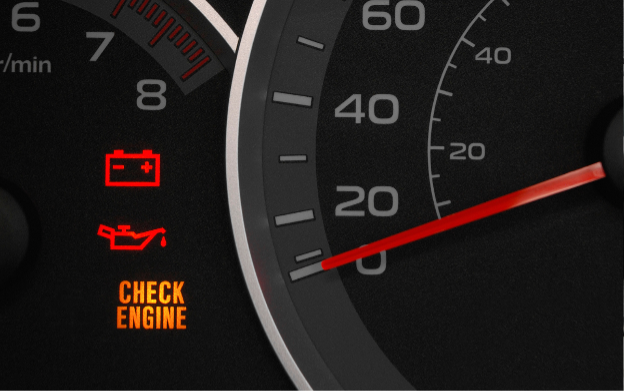Have you ever been driving, only to notice your car's check engine light suddenly illuminating on the dashboard? It's a common scenario for many drivers, and while it can be a source of stress, understanding the reasons behind it is the first step to addressing the issue.
GreenTech Automotive is a one of the leading Sonoma County auto repair shops, here to guide you through the potential causes of check engine light activation and how to handle it.
The Most Common Reasons for The Check Engine Light
The check engine light, officially known as the Malfunction Indicator Lamp (MIL), is a critical signal from your car's onboard diagnostics system (OBD-II). When this light is illuminated, it indicates that the system has detected a malfunction in the vehicle's engine or emissions control system. The reasons can vary from simple to complex, some issues requiring a professional mechanic while others might be able to be fixed yourself.
Oxygen Sensor Failure
Your vehicle's oxygen sensors monitor how much unburned oxygen is in your car's exhaust system. When these sensors fail, your car's computer receives incorrect information, leading to reduced fuel efficiency, increased emissions, and potential damage to components like the catalytic converter. It's crucial to replace faulty oxygen sensors to maintain optimal engine performance and fuel economy.
Loose or Faulty Gas Cap
It may seem trivial, but a loose or damaged gas cap can cause your check engine light to turn on. The gas cap seals the fuel system and maintains pressure while preventing fuel vapors from being released into the atmosphere when your car is not running. If it's loose, damaged, or missing, fuel can evaporate, and the vehicle's fuel system might not function properly, leading to increased emissions and reduced fuel economy.
Catalytic Converter Issues
The catalytic converter plays a vital role in reducing exhaust emissions, converting harmful pollutants into less harmful emissions before they leave the exhaust system. If your catalytic converter is failing, you'll likely experience reduced performance and fuel economy, and your vehicle may run at a higher temperature. Ignoring this issue can lead to a complete failure, necessitating an expensive replacement.
Mass Airflow Sensor (MAF) Malfunction
The MAF sensor determines the mass of air entering the engine to adjust and deliver the correct fuel amount to the engine. A malfunctioning MAF sensor can result in improper air-fuel mixtures, leading to poor engine performance, decreased fuel efficiency, and increased emissions. Timely maintenance can prevent this issue and ensure optimal performance.
Spark Plug/Ignition Coil Issues
Spark plugs ignite the air/fuel mixture in the combustion chamber, while ignition coils provide the spark plugs with the high voltage they need. Faulty spark plugs or ignition coils can lead to misfires, reduced power, poor fuel economy, and increased emissions. Regular inspection and replacement of these components are essential for maintaining engine performance.
Exhaust Gas Recirculation Valve (EGR) Problems
The EGR valve helps reduce nitrogen oxide emissions by recirculating a portion of the engine's exhaust gas back to the engine cylinders. If the EGR valve is malfunctioning, it can lead to a range of issues, including poor engine performance, increased emissions, and the potential for engine knocking.
When the check engine light comes on, it's crucial not to ignore it. While it might not always signify an immediate major problem, addressing it promptly can prevent more significant issues down the line. At GreenTech Automotive, we recommend getting a professional diagnostic check to identify the root cause accurately.
Is It OK To Drive With the Check Engine Light On?
One of the most common questions is whether it's safe to continue driving when the check engine light is on. The answer depends on the nature of the problem, but here's a general guideline to help you make an informed decision.
Immediate Attention vs. Monitoring: If the check engine light is flashing, this indicates a more severe issue that requires immediate attention. A flashing light often signifies a critical problem that could lead to significant damage if not addressed promptly. In such cases, it's advisable to pull over safely and call for assistance.
While you might be able to continue driving for a short distance, it's crucial to get your vehicle checked as soon as possible. Ignoring the light can lead to more severe problems down the line, potentially resulting in costly repairs.
Potential Risks: Driving with the check engine light on can pose various risks, including reduced performance, lower fuel efficiency, and even the potential for the vehicle to break down. Moreover, if the issue relates to emissions control, it could lead to your vehicle emitting harmful pollutants above the legal limit.
Use your best judgment. If the car seems to be running as usual, and the light is steady, you should be okay to drive it to the nearest service center for a diagnostic check. However, if you notice any unusual behavior in your vehicle's performance, such as stalling, misfiring, or loss of power, it's best to stop driving and seek professional help.
What Should I Do If My Check Engine Light Comes On?
If your check engine light comes on, here are a few steps you can take:
Check the Gas Cap
Ensure it's tight and in good condition. If the light turns off after tightening, you've solved the issue!
Reduce Stress on the Vehicle
Avoid heavy acceleration and high speeds to prevent potential damage.
Visit GreenTech Automotive
Our professionals will diagnose and resolve the issue efficiently, ensuring your vehicle's longevity and performance.
A Professional Team, Ready to Help You!
The check engine light is a vital indicator of your vehicle's health. While it might be tempting to ignore, addressing it promptly can save you time and money in the long run.
Is your check engine light on? Don't wait for minor issues to become major problems. Visit GreenTech Automotive online or call 707-545-7076 today for a comprehensive diagnosis and expert repair. Drive with confidence, knowing your car is in capable hands. Call us or visit our website to schedule an appointment!

